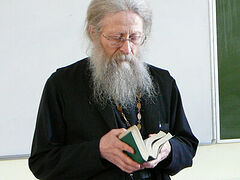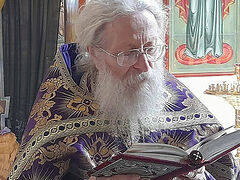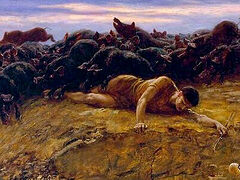Part 1: Christian Exorcism and Holiness
Part 2: Baptism, and Eight Steps to Casting Out Our Own Demons
Part 3: Possession vs. Psychiatry
 Giovanni Paolo Panini. “Apostle Paul preaching on the ruins,” 1744. State Hermitage Museum, St. Petersburg
Giovanni Paolo Panini. “Apostle Paul preaching on the ruins,” 1744. State Hermitage Museum, St. Petersburg
I would like to emphasize the biblical teaching about holiness. It’s slightly outside the context of the general thrust of pastoral theology. But it is also important and relevant for the self-awareness of a pastor and his flock, and accordingly, to everything that happens between us. It is the doctrine of holiness. In order to get an idea of the necessity of this teaching, I won’t start at the beginning, but later we’ll return to the beginning. Do you usually read the Patriarchal Epistles? There is such a thing, right? How about the Hierarchical Epistles? So, was there an epistle from the Patriarch addressed to the Metropolitan of Pskov with the presbyters, deacons and all the saints of the Pskov Diocese. Did you receive such a Patriarchal epistle? Where the Patriarch wrote to the saints of the Pskov Diocese? I won’t pull your leg any longer, we have never received any such epistles—they do not exist.
Now, let’s look at the Scriptures. The Apostle Paul to the Romans, to all that are in Rome, yesterday’s Gentiles, pagans: called to be saints. To the Corinthians: to those who are sanctified in Christ Jesus, called to be saints. To the Ephesians: to the saints who are in Ephesus, and faithful in Christ Jesus. You could have received the following epistle: “To those saints who are in Abakan and the faithful in Christ Jesus.” Here’s an interesting one. To the Philippians: to all the saints in Christ Jesus who are in Philippi, with the bishops and deacons. Interesting! I particularly like this one: To all the saints, with the bishops and deacons. To the Colossians: to the saints and faithful brethren in Christ who are in Colosse. To the Hebrews: Holy brethren, partakers of the heavenly calling. In all of his epistles, the Apostle Paul addresses saints. Now raise your hands, which one of you present here is a saint? One of you raised his hand.
That was only for starters. So, we need to clarify who is a saint. A saint is a person who is accomplishing the ministry of sanctification. “Kadosh” (and wasn’t I just asked about languages?) means holy in Hebrew. What does that mean? Let’s think about it. We have the following situation. An old lady, well, it could be anyone, it doesn’t matter who. But usually it is an person unlearned in church matters, and more often than not, an old lady.
“What sins are you guilty of?”
“I am not guilty of anything.”
So, we have a few priests here, right? You’ve definitely met people like that. So, we have a person who comes and says that she has no sins. The priest gets sarcastic: “So, what are you, some kind of saint?” That’s all there is to say, drop the subject.
Now let’s respond to the question: Who was wrong in this situation? A parishioner says she has no sins—is she right or wrong? Wrong. It’s clear. That is, she doesn’t understand the meaning of sin. But when a priest, in an attempt to spite or touch a raw nerve, says to her, “Are you holy?” Is he right to ask this question?
From the audience:
—The saints had sins, too.
Father Gennady:
—Yes, the saints did, too. But they repented of their sins. So, had he been correct, and she was a saint, she would have told him she had sins. Therefore, batiushka was clueless in his attempt to reason with her. That is, we actually have to knock some sense into that priest. Why? Because what does “Are you a saint” mean? What is the implication of his question? Meaning, what is holiness? Sinlessness. For, since she says, “I am sinless,” he responds, “Are you holy, are you a saint?” It sounds like the priest thinks that a saint is sinless. Is he right? No. But if we can’t ask too much of her, we ought to ask quite a bit more from the priest. What did I tell you? We have these issues that are so confusing that we don’t grasp them ourselves; we are unable to understand who we are, or what we are doing.
The priest thinks that a saint is sinless. Is he right? No
So, what does “kadosh” mean? It is a Hebrew word, from the Biblical Hebrew, that generally means “to cut off, to set apart.” In other words, a saint is someone who was kept apart. To be holy or holiness means otherness. There is a very succinct word in the German language that means, “to be something else.” To be someone different. So, here we go again. Can water be holy? Yes, it can. What does it have to do with sins? I keep talking about that priest who asked, “Are you a saint?” Because I know that priests continuously besiege their parishioners with questions like this.
What does it mean—is the water holy or not? So, is ordinary water sinful but this water is sinless? Obviously, it’s absolutely not what we’re talking about here. It is water that is cut off or set apart. We separated one cubic decimeter from a cubic meter of water. So, can we wash the floor or cook borscht with that cubic decimeter of holy water now? No. It was made separate and forbidden for everyday use. That is, it is now supposed to be used for quite specific causes. That’s what “separated” is about.
A saint—a holy person—is someone set apart from this world. Israel was called a holy nation as early as the Book of Exodus. What kind of people were they? Were they sinless or something? Yeah, right! Read the book of Exodus, to see how sinless they were. So what does it mean, that Israel was a holy nation? It means that it was set apart from all other nations. And if all the other peoples were “allowed” to pray to idols or do other things, with some rather awful things going on there... this nation was set apart and sanctified. That is, removed from general use. And then we have the word “dedicated.”
A book author writes in his book: dedicated to my mother’s blessed memory. What does it mean? He assigns this book to his mother. It is hers, dedicated to her. This is dedication. Made separate, taken from everyday use and given to God. To do the Divine works. It isn’t intended for the affairs of this world. This is the biblical meaning of the word “holy.”
The Greek word angelos, that we chant and pronounce is quite interesting, too. It’s a lot more complicated. The fathers likely derive it from aglos, meaning the absolution from sin.1 Or even the sin demanding to be cleansed. You know, our women among the faithful will understand this concept quite well. If a white blouse is stained, what does the dirty stain do? It screams: get me out of here, I don’t belong here. So, our soul is that white blouse. “Grant me a garment of Light, O Thou Who wrappest Thyself in Light for a garment.” It is said during Baptism. We emerged all clean and washed, but then, plop—a dirty stain on our clothing. And this dirt screams: Get me out of here!
There is a man who steals, swears, and smokes, but overall he isn’t too bad of a guy. If we are talking about a Christian or, even worse, a priest—get me out of here, I don’t belong here. That’s what the Greek word agios means. In Russian and Slavonic, it is “holy.” Or, the light is here. Holy, meaning bright. We also have the German word “heilen”, meaning “to heal.” In other words, a healthy one. Holy means healthy, or a healthy soul. And we understand that in the given case, we aren’t talking about physical health.
Who is holy? First of all, it is Holy God. “Holy God, Holy Mighty, Holy Immortal, have mercy on us.” What does it mean that God is Holy? Who is He separated from? We should rather use the first reference value, or the Biblical meaning, of this word in this instance.
The Holy Spirit is not simply sinless God. In our consciousness, He is often sinless. The Holy Spirit is when there was no sin at all—neither the fall of man nor Lucifer the Morning Star, but only Holy God. He transcends this world. The holiness of God is His absolute transcendence. His absolute otherworldliness. He is not of this world.
Dionysius the Areopagite:
“You will learn in His book about the Divine names, and you will find that many theologians glorified Him not only as Invisible and Incomprehensible, but, at the same time, Unsearchable and Inscrutable. For there is no one who could fathom His innermost Boundlessness or Infinity.”
This is what is called apophatic theology. You haven’t yet had a chance to learn about negative theology. That is, not what God is, but what He is not. By the method of cutting off, using the negative—the Immortal, the Incomprehensible, the Invisible. That is, we don’t say what He is, but what He is not. Because we can’t say anything about what He is. The essence of God is absolutely incomprehensible. But as for what is comprehensible, we cut it off: no, not this kind, not that kind, or not the other kind. This is the otherworldliness and the incomprehensibility of ours.
You shall therefore consecrate yourselves, and you shall be holy; for I am holy (Leviticus 11:44). This too is quite interesting: the holiness of God requires us to be holy. He is Otherwordly, so we should have otherworldliness. The holiness of God was made manifest in the Old Testament primarily in two ways.
The first manifestation is the glory of the Lord. The glory of the Lord does not mean to glorify God. Here, we say, “Glory to Thee, O God.” But, the glory of the Lord filled the Holy of Holies in such a way that the priests could not see each other. The glory of the Lord left the temple at the time of the Prophet Ezekiel, before the Babylonian captivity. “Before him went the Glory of the Lord.” That is, the Glory of the Lord was like some kind of a cloud. In Christian terminology it corresponds to grace. Grace descended upon him. Grace has left him. That is, the Glory of the Lord is the Divine presence. So this is the holiness of the Sovereign Lord.
The second one is the name. Thus, the third commandment: Thou shalt not take the name of the Lord thy God in vain. Why? Because it is holy. As for the Jews, it even went so far that, in the post-war period—some claimed it had happened even earlier—that they never said the name of the Lord aloud.
So, you already know the name of the Lord, and the essence of our conversation. Is God the name of the Lord? Well, if I say that you’re a man, did I call you by name? If I call you a seminarian, did I call you by name? That’s not your name. Therefore, “God,” “the Lord” are rather the words expressing some or other of His attributes. Yahweh is a sacred tetragram. “Jehovah” sounds more familiar to us, though. However, it is misinterpreted here. But that’s not my job to teach about it today—you will learn that during your Bible studies. Yahweh—what’s the point here? When Moses asks God at the Burning Bush what His name is, he hears: I AM Who I AM. Now, say, someone is knocking at the door. I inquire, “Who is it?” “Me.” “Who are you?” “It’s me who I am.” Is it an answer or a refusal to answer? It’s a refusal. But he doesn’t stay silent!
On the one hand, he answers, I now know that this is him. But I don’t know who he is. He is who he is. That is, the name expresses the subject named. But we have just said that the holiness of God is His absolute transcendence.
Therefore, the name of God expresses the incomprehensibility of God. But let’s look at our names. There was someone who was first to bear my name. What kind of person do you think he was? My name means “noble.” What about Ivan? Maybe we’ve got Ivans in the audience. It means the “grace of God.” And so on. So, the names mean or express something. As for the name of the Lord—it expresses nothing, it attests to ineffability. So, this is what the holiness of God is about.
There are two types of holiness. Hieratic sanctity is everything that can be touched. In hieratic sanctity, taboos are particularly important—taboos in religion in general, and in revealed religion, too. Did God bless the seventh day? Labor six days, but set the seventh day aside. It is set aside from the rest. For it says, “and sanctified it.” It means: do not touch this day, it belongs to me. That is, make this day holy. So, the Fourth Commandment is about hieratic sanctity, the only one among the Ten Commandments.
Well, but then follows the full complex of worship: the temple, the Holy of Holies, the sacrifices, and so forth. It means everything that is dedicated to God. We also have hieratic sanctity. We, too, conduct services, we have altars, the altar table and table of oblation, the chalice and the diskos, and so on; and finally there is also the riassa. These are the objects of hieratic sanctity. That is, we set apart all of these objects. There are all kinds of spoons, but we take one—and that’s it, we no longer use it to stir the tea. This spoon is reserved for the Cup of the Lord. We even call it differently, the Communion Spoon. It is set apart, no longer meant for common use. This is hieratic sanctity. Hieratic sanctity in Orthodoxy does exist. It is when we set certain things apart from their everyday use and assign them to God.
The second kind of holiness is spiritual and moral holiness. Speaking of the first kind of holiness, who is supposed to facilitate it? The clergy—that is understood. What about the spiritual and moral kind? In the Old Testament, they had the prophets. The prophets castigated the people for their vices. The Prophet Isaiah: When you come to appear before Me, Who has required this from your hand, to trample My courts? Bring no more futile sacrifices; incense is an abomination to Me. The New Moons, the Sabbaths, and the calling of assemblies–I cannot endure iniquity and the sacred meeting (Isaiah 1:12).
That is, you see, how you can be a guardian of hieratic sanctity and at the same time the bearer of moral abomination. Now, this applies to us to a great extent. As priests, we are the bearers of hieratic sanctity. That’s what we do. It is surely a good thing there aren’t too many prophets, otherwise our brother a priest would get scourged! That’s why the pike is in the river, to keep the carp awake, right? That’s why a prophet is needed: to keep priests from getting brazen. See, he’s all carried away with hieratic sanctity, but slacking in his work, like the sons of Eli, who were priests. There sacrifices were made, but before the meat could reach the altar, they fished it out of the containers and down it went into their mouths and bellies.
They paid the price for that. They all perished. Eli, their father, died, too. And the Ark of the Covenant fell into the hands of the Philistines.
Don’t assume that we are martyrs for the Faith. Not only for the Faith, but probably our sins as well
So, when holy places are desecrated, it is most likely due to an ongoing crisis, in other words, we got ourselves into trouble, so to speak. That’s why it is very important to have spiritual and moral holiness, where we priests watch out not only for things like, “don’t eat or drink before Communion and read the canons.” It is hieratic sanctity, and that’s fine. But if it isn’t within a context of spiritual and moral holiness, God punishes painfully for this. He punishes the priests, first and foremost. Besides, when they started to execute us one hundred years ago,2 let’s not assume: oh, we are martyrs for the Faith. What if, not only for the Faith, but also for probably for our sins?
I’ve had many conversations with a man of my father’s generation, who spent eighteen years in the camps. His was convicted on absolute and utter nonsense, of course; an “enemy of the people”. These people were not enemies at all. He used to say repeatedly: “We deserved those sufferings. We had to walk that path.” Not based on those utterly ridiculous charges brought against them, like being a part of a counter-revolutionary cell, or things like that. But because of what we are talking about. Actually, we don’t fully understand it. Perhaps we glorify the New Martyrs but we pay little attention to the reasons why this sorrow befell us. It could surely happen to us again. We could get ourselves into the same mess. That’s why, like in the Old Testament, the temple was twice destroyed. The greatest holy place, established by God, was taken by God. First Solomon’s temple, and then Zerubbabel’s temple. Everything went to waste, because there was no spiritual or moral holiness. We as pastors should be fully conscious and become aware of this also.





